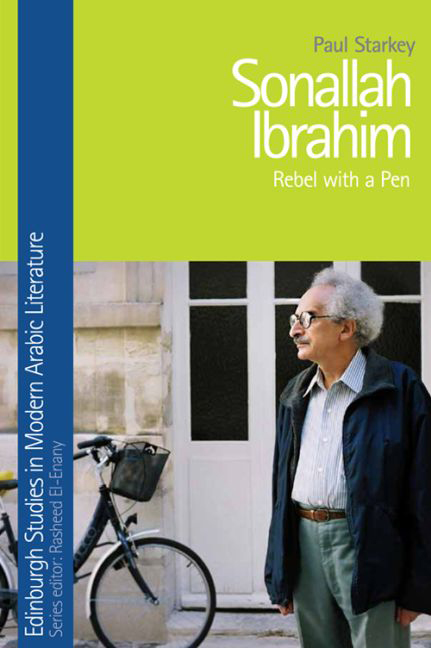Book contents
- Frontmatter
- Contents
- Series Editor's Foreword
- Preface
- 1 Introduction: Background and Context
- 2 Rebel with a Pen
- 3 Cairo Prison: Tilka al-raʾiha (1966)
- 4 Michelangelo and the Dam: Najmat Aghustus (1974)
- 5 CocaColaland: al-Lajna (1981)
- 6 War in Lebanon: Bayrut, Bayrut (1984)
- 7 Consumer Society: Dhat (1992)
- 8 Prison of Dishonour: Sharaf (1997)
- 9 Widening Horizons (1): Sex, Memory and Revolution: Warda (2000)
- 10 Widening Horizons (2): In the Land of the Capitalists: Amrikanli (Amri Kan Li) (2003)
- 11 Return to Childhood: al-Talassus (2007)
- 12 The French Connection: al-ʿImama wa-al-Qubbaʿa (2008) and al-Qanun al-Faransi (2008)
- 13 Filling a Gap: al-Jalid (2011)
- 14 Epilogue
- Bibliography
- Index
8 - Prison of Dishonour: Sharaf (1997)
Published online by Cambridge University Press: 23 September 2017
- Frontmatter
- Contents
- Series Editor's Foreword
- Preface
- 1 Introduction: Background and Context
- 2 Rebel with a Pen
- 3 Cairo Prison: Tilka al-raʾiha (1966)
- 4 Michelangelo and the Dam: Najmat Aghustus (1974)
- 5 CocaColaland: al-Lajna (1981)
- 6 War in Lebanon: Bayrut, Bayrut (1984)
- 7 Consumer Society: Dhat (1992)
- 8 Prison of Dishonour: Sharaf (1997)
- 9 Widening Horizons (1): Sex, Memory and Revolution: Warda (2000)
- 10 Widening Horizons (2): In the Land of the Capitalists: Amrikanli (Amri Kan Li) (2003)
- 11 Return to Childhood: al-Talassus (2007)
- 12 The French Connection: al-ʿImama wa-al-Qubbaʿa (2008) and al-Qanun al-Faransi (2008)
- 13 Filling a Gap: al-Jalid (2011)
- 14 Epilogue
- Bibliography
- Index
Summary
Five years separate the publication date of Dhat (1992) from that of Sonallah Ibrahim's eagerly-awaited next novel, Sharaf, completed at the end of 1996 and published in 1997. The novel, which occupies some 470 pages in the Arabic edition, returns us to the prison environment of Tilka al-raʾiha with which the author had begun his novelistic career to develop a number of disparate themes encountered in his previous works, including those of corruption, hypocrisy, sexual deviancy and globalisation. At the same time, the work carries forward and further develops the novelistic techniques already noted in previous chapters, most obviously in Dhat. Although several of the themes of Dhat find an echo in Sharaf, and the protagonists of the two works are linked by their humble backgrounds, however, their situations are quite different: for unlike Dhat (whose social status and situation as an Egyptian housewife is a wholly unexceptional one) that of the protagonist of Sharaf (an Egyptian youth consigned to prison for killing a foreigner who has tried to rape him) is both extraordinary and desperate –much of the narrative, indeed, being occupied with his discussions with his lawyers in an attempt to find a way of escaping from his predicament.
Publication and Translations
The full text of Sharaf was published in Cairo in book form by the state-run Dar al-Hilal in 1997, as part of the long-established Riwayat al-Hilal literary series, which had been founded in 1949. This represented a departure from Sonallah Ibrahim's normal publishing practice. Unusually also, some material from the opening chapters had already been serialised in the Egyptian literary weekly Akhbar al-Adab, edited at the time by the equally eminent Egyptian novelist Gamal al-Ghitani, who contributed an editorial entitled ‘Sharaf sunʿ Allāh’ in which he summed up Sonallah Ibrahim's career as marked by dedication and asceticism and characterised Sharaf as
perhaps his chef d'oeuvre, where he represents a whole age towards which he feels total estrangement: an estrangement that he audaciously and astutely expresses artistically and creatively … with techniques which characterise his work alone, especially the documentary level which he transforms into pure creative energy, replete with black humour.
- Type
- Chapter
- Information
- Sonallah IbrahimRebel with a Pen, pp. 123 - 135Publisher: Edinburgh University PressPrint publication year: 2016



